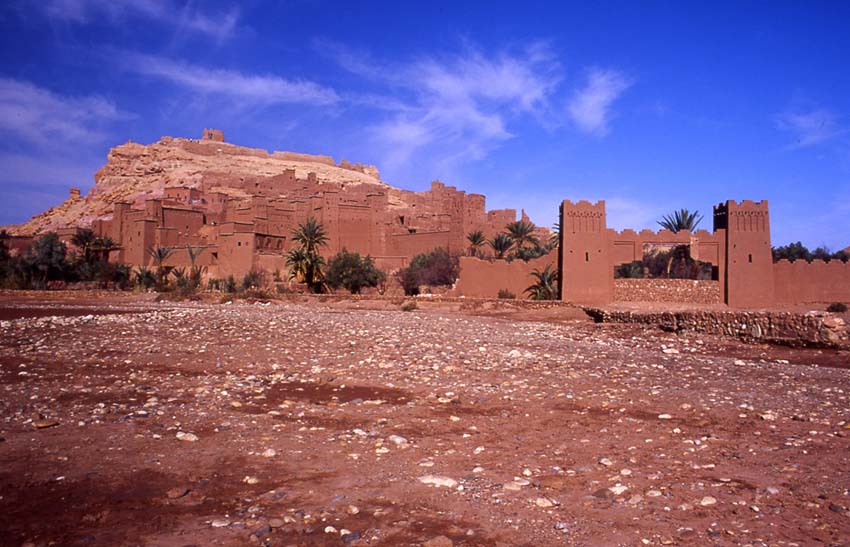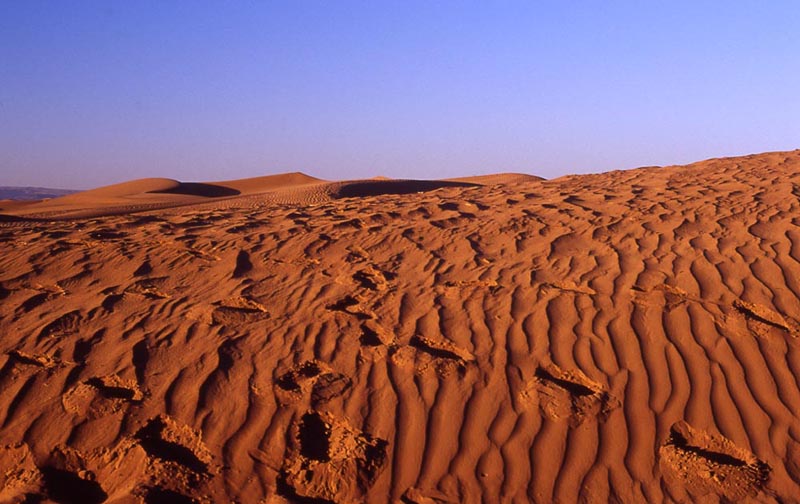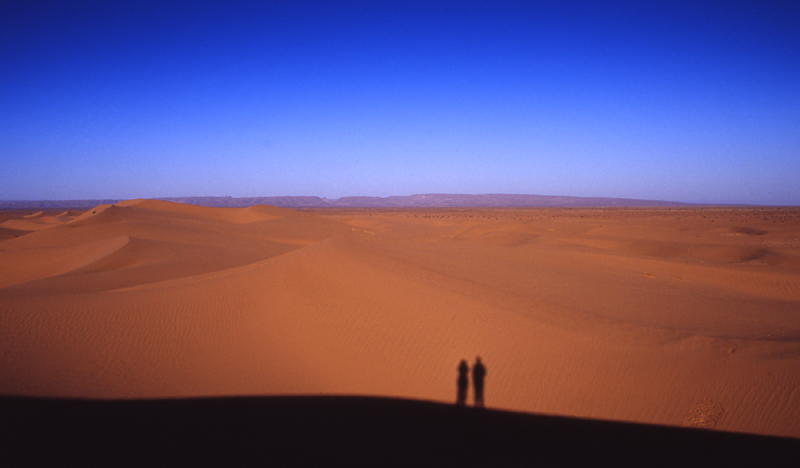I 'd only been in the Sahara desert for a few minutes before I felt a friendly nudge at my shoulder. Turning around I came face to nose with two camels. "Meet Peter and Blakhir," said a man, who had seemingly appeared out of nowhere, and who I would later come to know as one of our guides. "They want to be friends." More to the point, these one-humped creatures had their bulging eyes fixed firmly on the leftover peeling from my orange - their favourite treat and one they seemed to be able to smell from miles away. Seconds later the orange peel had been happily gobbled up from my open palm and a few grunts offered in thanks, before they wandered off and I was left once again to admire the views.
My journey to the desert had actually begun a day earlier, when a gentle man named Mohammed picked me up in an aging Mercedes taxi (it had already clocked up nearly half a million miles) for the nine-hour drive from Marrakech. Along the way we stopped at the eleventh century kasbah of Ait Ben Haddou, where the locals told us proudly how their fort had been used in famous Hollywood blockbusters like Gladiator and invited us in to share a glass of mint tea. Back in the car, we watched barren fields turn into lofty mountains, struggled to stay upright as we manoeuvred around twisty roads that make Canada's winding Cabot Trail look as straight as a Prairie highway. Out the window village after village zipped by, each one with its local specialty: freshly squeezed orange juice, colourful hand-woven rugs and semi-precious stones collected by local children.

The trek started the next morning from Zagora - a dusty one-road town that greets you with the sign "Timbuktu - 52 days by camel caravan". Hosted by Brahim Elaabdouli, a history graduate and story teller extraordinaire, we started by rising early to drive down a remote road and through several army checkpoints (security is tight so close to the Algerian border). Half an hour later the dunes of Erg Lihoudi appeared on the horizon, giving us our first glimpse of the Sahara. Not long afterwards the car dropped us off at a remote camp known as the bivouac, and by lunchtime we were happily walking through the seemingly endless desert, accompanied by only a few guides and the two camels. But the desert wasn't the place I'd imagined. Instead of starting with sleek and sandy dunes, the ones I'd admired on countless postcards, the Sahara started with a rocky plain. The only sign of life came from a few scraggly bushes underfoot.
Our goal was to reach a cluster of small sand dunes by dusk, about four hours walk away, where we would spend the night next to a well. As Brahim explained, the direction of our trek depended on where we could find water for the camels. They can go up to a week without drinking, but are happier and work harder if they can drink at least every two days. In this part of the world, locals tell stories about how green strips of irrigated land once extended miles into the desert. But one generation later the ground is now truly parched. It hasn't rained here for at least six years and wells are further apart than ever before. "We hope it will rain this year, ensha'llah," one elderly man said, looking towards the sky. Ensha'llah means "God willing" and it was a word I would hear at the end of nearly every sentence in Morocco.
With a persistent December sun shining down on our turban-covered heads the walk was a hot one, but also very relaxing. The only sound came from the camels as their wide, leathery feet plodded through the sand. They set the pace, so hurrying was out of the question. On distant makeshift roads, clouds of dust rose where air conditioned vans whisked groups of tourists off to luxury camps. But it was unlikely we would meet anyone on our trek. And maybe it was better that way. With water always in short supply, cleanliness was quickly thrown to the wind. We wouldn't see a shower for at least five days and soon we were joking about who smelled worse - us or the camels.

We reached our camping spot just before dusk. Weary from the walk, I gladly accepted the offer of a seat under a nearby tamaris tree, while Brahim and the two other guides - Ahmed and Ali - set up the tents and tied together the camels' feet so they wouldn't wander too far during the night. Soon the fire was lit, the tea was made and we were all dining on a chicken tagine, a traditional Moroccan stew. Over the next few days, Brahim turned basic ingredients into tasty dishes with an ease that would have put a Michelin-starred chef to shame. A few eggs, some vegetables, flour and water became savoury omelettes, Berber pizza and pain à la sable, a crusty bread baked under a mound of sand and hot coals gathered from the fire.
Perhaps even better than the food - although it was a close contest - was the entertainment. Each evening, under a starry sky, we huddled around the fire to puzzle over brain teasers, play checkers in the sand using sticks and camel dung for pieces (in the desert you have to improvise) and bang out musical tunes on empty water bottles. Mornings were equally relaxing. We rose with the sun and ate our fill of sweet oranges and bread dipped in honey while the guides went in search of the camels. Even with their legs tied, they managed to walk for miles while we slept. Once back at the campsite, the camels had to be coaxed onto the ground with offers of orange peels (their favourites) so they could be loaded for the day ahead. Only then did we set off for another day of trekking through the sand.

After four days of walking we finally reached the most magical of camp sites - the big dunes of Ouad Naam. They towered over us, more than a hundred meters tall, and it only took a few moments before a wave of childlike excitement sent us scrambling to the top. Cool sand poured over our bare feet, tickling toes and soothing hard-earned blisters. But the real reward was reaching the highest crest just in time to watch a blazing red sun sink below the horizon. Below us, date palms spread out on the desert floor and we could see the camels already drifting away in search of food.
On the last morning we rose reluctantly, knowing we had to start the journey home. Perhaps the camels sensed we did not want to go because during the night they pulled the ultimate stalling tactic -- getting lost. While Ahmed headed off to find them, we took our time over breakfast, sipped several cups of Brahim's famous mint tea. We waited, watched the sun rise higher in the sky and waited some more until finally, near midday, we made the decision to head back to the bivouac. It was dusk before we found those naughty camels. They had spent the whole night wandering all the way back to the main camp, where we had begun our trek, with their legs tied together before Ahmed finally caught up with them. But somehow they still found the energy to scramble up for one last handful of orange peels and a friendly nudge goodbye, until the next time. Ensha'llah.